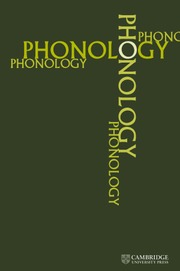Crossref Citations
This article has been cited by the following publications. This list is generated based on data provided by
Crossref.
Paster, Mary
2005.
Yearbook of Morphology 2005.
p.
155.
Idsardi, William J.
2006.
A Simple Proof That Optimality Theory Is Computationally Intractable.
Linguistic Inquiry,
Vol. 37,
Issue. 2,
p.
271.
Yip, Moira
2006.
Phonology in the Smith era.
Lingua,
Vol. 116,
Issue. 10,
p.
1470.
Jäger, Gerhard
and
Rosenbach, Anette
2006.
The winner takes it all — almost: cumulativity in grammatical variation.
Linguistics,
Vol. 44,
Issue. 5,
Hyde, Brett
2007.
Non-finality and weight-sensitivity.
Phonology,
Vol. 24,
Issue. 2,
p.
287.
Hyde, Brett
2007.
Issues in Banawá Prosody: Onset Sensitivity, Minimal Words, and Syllable Integrity.
Linguistic Inquiry,
Vol. 38,
Issue. 2,
p.
239.
Kratzer, Angelika
and
Selkirk, Elisabeth
2007.
Phase theory and prosodic spellout: The case of verbs.
The Linguistic Review,
Vol. 24,
Issue. 2-3,
Bradley, Travis G
2007.
Constraints on the metathesis of sonorant consonants in Judeo-Spanish.
Probus,
Vol. 19,
Issue. 2,
Yu, Alan C. L.
2007.
A Natural History of Infixation.
Gouskova, Maria
2007.
The reduplicative template in Tonkawa.
Phonology,
Vol. 24,
Issue. 3,
p.
367.
Zhang, Jie
2007.
A directional asymmetry in Chinese tone sandhi systems.
Journal of East Asian Linguistics,
Vol. 16,
Issue. 4,
p.
259.
Mascaró, Joan
2007.
External Allomorphy and Lexical Representation.
Linguistic Inquiry,
Vol. 38,
Issue. 4,
p.
715.
Boersma, Paul
2007.
Some listener-oriented accounts of h-aspiré in French.
Lingua,
Vol. 117,
Issue. 12,
p.
1989.
Coetzee, Andries W.
and
Pater, Joe
2008.
Weighted constraints and gradient restrictions on place co-occurrence in Muna and Arabic.
Natural Language & Linguistic Theory,
Vol. 26,
Issue. 2,
p.
289.
COLLIE, SARAH
2008.
English stress preservation: the case for ‘fake cyclicity’.
English Language and Linguistics,
Vol. 12,
Issue. 3,
p.
505.
Kennedy, Robert
2008.
Bugotu and Cheke Holo reduplication: in defence of the Emergence of the Unmarked.
Phonology,
Vol. 25,
Issue. 1,
p.
61.
McCarthy, John J.
2008.
The serial interaction of stress and syncope.
Natural Language & Linguistic Theory,
Vol. 26,
Issue. 3,
p.
499.
Chan, Erwin
and
Yang, Charles
2008.
Kenneth R. Beesley & Lauri Karttunen, Finite State Morphology. Stanford, CA: CSLI Publications (distributed by the University of Chicago Press), 2003. xviii + 505pp. and CD-ROM. ISBN hardbound 1-57586-433-9, paperbound 1-57586-434-7..
Word Structure,
Vol. 1,
Issue. 2,
p.
246.
Heinz, Jeffrey
2009.
On the role of locality in learning stress patterns.
Phonology,
Vol. 26,
Issue. 2,
p.
303.
Finley, Sara
2009.
Morphemic harmony as featural correspondence.
Lingua,
Vol. 119,
Issue. 3,
p.
478.


